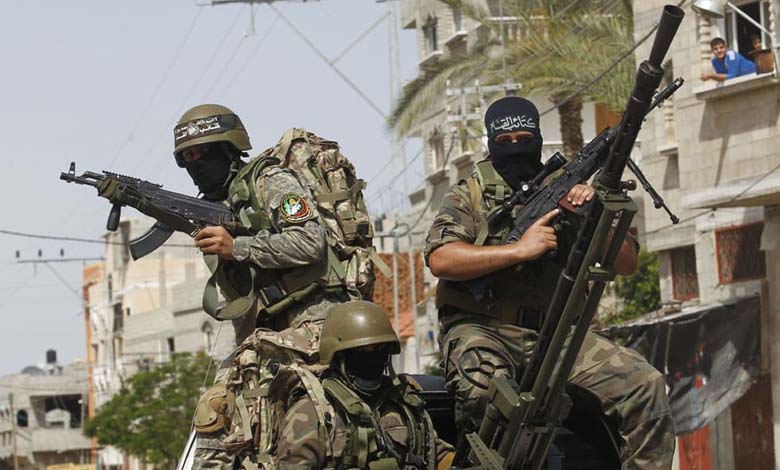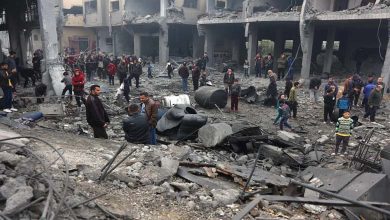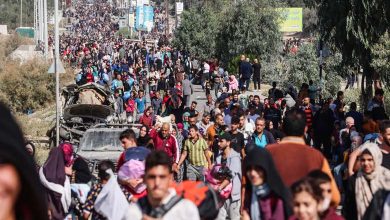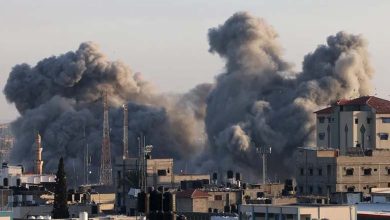Hamas Flexibility Revives Hopes for Ceasefire in Gaza
Secretary Blinken Works with Regional and International Partners to Ease Tensions During Ramadan

Renewed hopes for a ceasefire in the ongoing war between Israel and Hamas for over five months in the besieged Gaza Strip are emerging, with Hamas showing flexibility in easing its conditions for a prisoner exchange deal, while the first ship unloads 200 tons of food in Gaza in preparation for distribution to starving residents.
The mediating countries – the United States, Qatar, and Egypt – are working towards an agreement on a ceasefire and a prisoner exchange between Palestinian hostages and prisoners held by Israel.
On Friday, Hamas proposed a six-week ceasefire agreement involving a prisoner swap for Palestinian prisoners, in what is considered a more flexible stance after initially demanding a complete cessation of hostilities before any agreement on the release of hostages held in Gaza.
A Hamas leader said the movement is prepared to release 42 Israeli hostages among women, children, the elderly, and the sick, “provided that Israel releases 20 to 30 Palestinian prisoners for each Israeli hostage held.” Hamas is demanding the release of 30 to 50 Palestinian detainees in exchange for each soldier held by them. It’s the first time it has spoken about releasing recruits.
The proposed first stage also includes “military withdrawal from all cities and populated areas in the Gaza Strip and the unrestricted return of displaced persons, with a flow of aid of at least 500 trucks per day.”
U.S. Secretary of State Antony Blinken pledged during a stop in Manama, the capital of Bahrain, to “continue to coordinate” with “regional and international partners” to “ease tensions during Ramadan,” according to department spokesman Matthew Miller.
Israeli Prime Minister Benjamin Netanyahu‘s office announced that an Israeli delegation would travel to Qatar to participate in negotiations for a hostage release deal in exchange for the release of Palestinian prisoners as part of a ceasefire in Gaza.
The office clarified Saturday that the Prime Minister had called “the war cabinet and the security cabinet to meet (Sunday) to decide on authorizing the negotiating delegation before heading to Doha.”
-
Tragic Disaster… Witnesses of the Flour Massacre Describe Scenes of Horror, Chaos, and Death in Gaza
However, Israeli Finance Minister Avigdor Smotrich called Saturday via the XNetanyahu platform for “giving orders to the delegation to stay in Israel” and for “increasing military pressure until Hamas is eliminated.”
Netanyahu agreed to the army’s “operational plans” to launch a ground attack on Rafah, where according to the United Nations, about 1.5 million Palestinians, mostly displaced, are crowded, accounting for more than half of the total population of the Gaza Strip.
Meanwhile, Israeli airstrikes did not cease throughout the night. Hamas Health Ministry spokesman Ashraf al-Qudra announced Saturday morning that 36 people were killed in a strike that targeted early Friday night a house hosting dozens of displaced Tabatibi family members and their relatives, including children, pregnant women, in the Nusseirat camp, in central Gaza.
At the nearby “Al-Aqsa” medical center in Deir al-Balah, Mohammed Tabatibi (19), injured in his left hand, stood among dozens of bodies laid out on the ground in the emergency department courtyard, crying for his family.
He said, “This is my mother, this is my father, this is my aunt, and these are my brothers… They bombed the house while we were inside. My mother and aunt were preparing the suhoor meal… They all died. I don’t understand why they bombed the house and perpetrated a massacre.”
In response to a query by Agence France-Presse, the Israeli army said it was looking into the “circumstances of the incident,” confirming it had targeted Hamas fighters “in the Nusseirat area based on intelligence.”
World Health Organization Director-General Tedros Adhanom Ghebreyesus urged Israel not to launch its ground attack on Rafah city in the southern Gaza Strip, saying 1.2 million people there have no safe place to go.
He wrote on the X social media platform, “I’m very concerned about reports of an Israeli plan to carry out a ground attack on Rafah.” He added that “further escalation of violence in this densely populated area will lead to more deaths and suffering, especially as healthcare facilities are already under pressure.”
Amidst massive destruction, siege, water and electricity shortages, the UN fears widespread famine in the Strip, especially in the north, which is difficult to access and experiences security lapses.
Aid primarily comes from Egypt through the Rafah crossing in southern Gaza, after undergoing thorough Israeli inspection. However, it remains grossly inadequate given the massive needs of the 2.4 million population.
The ship belonging to the Spanish charitable organization Open Arms left Gaza on Saturday after unloading 200 tons of food with the help of a pier built by the World Kitchen Central organization.
Cypriot Foreign Ministry spokesman Theodoros Gotsis said Saturday that a second aid ship is ready and will depart for Gaza by the end of the week.
However, according to World Kitchen Central, weather forecasts indicate bad weather between Sunday and the end of next week, which could delay the ship’s departure.
There’s a race against time to try to deliver more humanitarian aid directly to the northern Strip by dropping it from the air from Jordan.
The United Nations, the European Union, the United States, and other countries insist that transporting aid by sea or air cannot be a substitute for its land entry.
Saturday, in Tel Aviv, families of hostages gathered again to demand the release of their loved ones held in Gaza. Demonstrators chanted, “Wherever we go, we talk about you, we sing for you, and we pray for you”.












